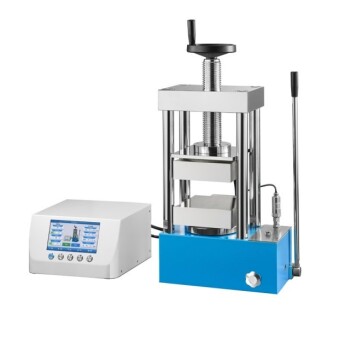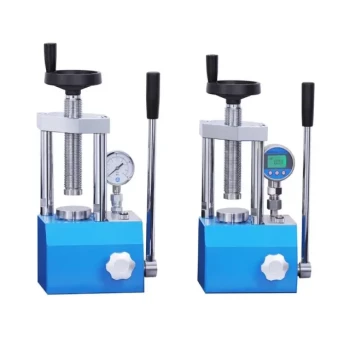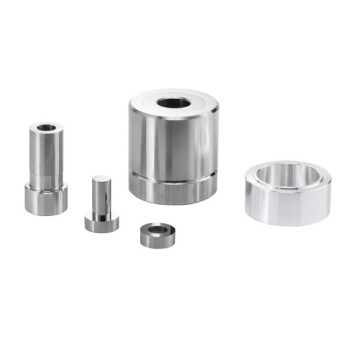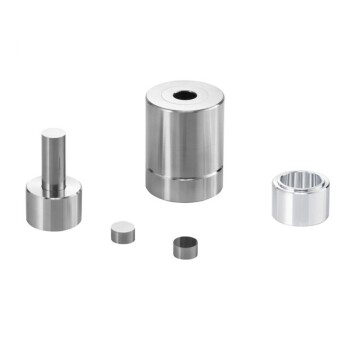In sample preparation, the required pressing load is not universal; it varies dramatically based on the material's fundamental properties. For instance, soft foodstuffs may only require 2 tons of force, while common pharmaceutical powders need around 20 tons, and hard industrial materials like mineral ores or slag often demand 25 tons or more to form a stable pellet for analysis.
The core principle is that pressing load must be matched to a material's inherent ability to deform and bond. Applying the wrong force—either too little or too much—is the primary cause of fragile, cracked, or analytically unreliable sample pellets.

Why Material Properties Dictate Pressing Load
Choosing the correct pressing force is less about the sample's general category and more about its specific physical characteristics. Three properties are paramount: deformation behavior, particle characteristics, and the presence of binders.
Plastic vs. Elastic Deformation
A material's response to pressure is the most critical factor. Plastic deformation is when a material permanently changes shape under load, like clay. These materials require less force to form a stable, cohesive pellet.
In contrast, elastic deformation is when a material "springs back" after pressure is released. Hard, crystalline materials exhibit high elasticity and require significantly more force to overcome this tendency and lock particles into a dense, stable structure.
Particle Size and Binding Properties
Fine, uniform powders pack more efficiently, requiring less force to eliminate voids and create a dense sample. Coarse or irregularly shaped particles need higher pressure to crush them and force them into a tightly packed matrix.
Furthermore, some materials have natural binding properties that help particles adhere. Materials lacking this, like sand or many minerals, often require an added binding agent to form a pellet at any reasonable pressure.
A Practical Guide to Sample Categories
While every sample is unique, we can group them into general categories to establish a starting point for determining the correct load.
Low-Load Samples (~2-10 Tons)
This category includes soft, organic, or polymeric materials like foodstuffs, plant matter, and some plastics.
Their high degree of plastic deformation means they compact easily. Applying excessive force can cause the sample to ooze out of the die set or lead to a flawed, stressed pellet.
Mid-Load Samples (~15-25 Tons)
This range is typical for many pharmaceuticals, chemicals, and blended powders.
These materials are often crystalline and have some elastic properties, requiring substantial force to create a uniform and non-friable disc for analysis techniques like FTIR. The goal here is often consistency and homogeneity.
High-Load Samples (25+ Tons)
Hard, brittle, and highly elastic materials fall into this group. Examples include mineral ores, cement, slag, ceramics, and soils.
A high load is essential to crush the individual crystalline or glassy particles, minimize voids, and overcome the material's strong elastic rebound. Without sufficient force, the resulting pellet will be fragile and unreliable.
Understanding the Trade-offs and Risks
Using the wrong pressure introduces significant problems that can compromise your results and even your equipment. The goal is always to find the optimal pressure, not the maximum.
The Dangers of Under-Pressing
An under-pressed pellet is the most common failure. It will be fragile, powdery, and may crumble during handling.
Analytically, its low and inconsistent density leads to poor results, particularly in X-Ray Fluorescence (XRF), where sample density is a critical parameter.
The Risks of Over-Pressing
Excessive pressure is just as problematic. It can cause a failure mode known as "capping" or "lamination," where the pellet splits into horizontal layers upon ejection from the die.
This occurs when stored elastic energy is released abruptly. In extreme cases, over-pressing can also damage the tungsten carbide die set or even the hydraulic press itself.
How to Determine the Right Load for Your Sample
Your sample's identity provides a starting point, but empirical testing is the only way to confirm the ideal parameters. Use the following guidelines to inform your method development.
- If your sample is soft and organic (e.g., plant matter, foodstuffs): Start with low loads (2-5 tons) to avoid sample extrusion and look for a glossy, solid finish.
- If your sample is a crystalline powder (e.g., pharmaceuticals, chemicals): Begin in the mid-range (15-20 tons) and inspect the pellet for durability and surface uniformity.
- If your sample is a hard, inorganic material (e.g., rock, cement, slag): High loads (25-40 tons) are typically necessary, but watch carefully for signs of capping.
- If your pellets are cracking or capping upon ejection: This is a classic sign of over-pressing an elastic material; try reducing the load or increasing the press's "dwell time" to allow air to escape.
Ultimately, understanding your material's behavior is the key to creating perfect, analysis-ready samples every time.
Summary Table:
| Sample Type | Typical Pressing Load Range | Key Characteristics |
|---|---|---|
| Low-Load (e.g., foodstuffs, plant matter) | 2-10 tons | High plastic deformation, prone to oozing if over-pressed |
| Mid-Load (e.g., pharmaceuticals, chemicals) | 15-25 tons | Crystalline, requires force for homogeneity and durability |
| High-Load (e.g., mineral ores, ceramics) | 25+ tons | Hard, elastic, needs high force to crush particles and prevent capping |
Struggling with pellet quality in your lab? KINTEK specializes in lab press machines, including automatic, isostatic, and heated presses, designed to deliver precise force control for materials like pharmaceuticals, minerals, and foodstuffs. Our equipment ensures durable, analysis-ready samples, boosting your lab's efficiency and accuracy. Contact us today to find the perfect press for your needs and elevate your sample preparation!
Visual Guide

Related Products
- Manual Laboratory Hydraulic Press Lab Pellet Press
- Automatic Laboratory Hydraulic Press Lab Pellet Press Machine
- Automatic Laboratory Hydraulic Press for XRF and KBR Pellet Pressing
- Laboratory Hydraulic Press Lab Pellet Press Button Battery Press
- Manual Heated Hydraulic Lab Press with Integrated Hot Plates Hydraulic Press Machine
People Also Ask
- How do you operate a manual hydraulic pellet press? Master Precise Sample Preparation for Accurate Analysis
- What is the primary purpose of a manual lab hydraulic pellet press? Ensure Accurate Sample Prep for XRF and FTIR
- What are the key features of manual hydraulic pellet presses? Discover Versatile Lab Solutions for Sample Prep
- What feature of the hydraulic portable press helps monitor the pellet-making process? Discover the Key to Precise Sample Preparation
- Why is a precise pressure of 98 MPa applied by a laboratory hydraulic press? To Ensure Optimal Densification for Solid-State Battery Materials



















